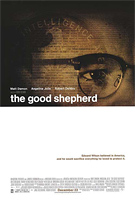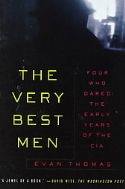Saturday, January 27, 2007
Monday, January 01, 2007
Evan Thomas could give DeNiro some pointers on making a good espionage film
 I saw The Good Shepherd over the holiday weekend. Directed by Robert DeNiro, starring Matt Damon and Angelina Jolie, it purports to be "the untold story of the birth of the CIA." Regretfully, it fails to deliver.
I saw The Good Shepherd over the holiday weekend. Directed by Robert DeNiro, starring Matt Damon and Angelina Jolie, it purports to be "the untold story of the birth of the CIA." Regretfully, it fails to deliver.
The plot is laid out across some notable events in the history of the Central Intelligence Agency -- it's origins in the OSS (Office of Strategic Services) struggling to roll back the Soviet tide in World War II, in anticipation of Stalin's bid for power, it's later operations in Central America and the Bay of Pigs fiasco, tied together from the perspective of a fictional character named Edwin Wilson (an amalgam of James Jesus Angleton and Richard Bissell). Failing to heed the advice of his mentor ("Get out while you still can, while you still have a soul"), Wilson's gradual moral corruption in the in the clandestine world of espionage and U.S. foreign policy is a window into the soul of our nation. "The Godfather Part II set in Langley, Virginia" as one reviewer put it.
While I am generally unapposed to the use of fictional characters when making a historical film, I wonder if, in this particular case, DeNiro couldn't have done better to forego the soap-opera and emphasize the history -- and even confine his gaze on a small part of that history for that matter. Covering three decades of U.S. covert operations and espionage would have been better accomplished in the form of a documentary series on PBS television. As a sprawling two hour and 46 minute Hollywood epic, one gets the sense that the scriptwriter (Eric Roch - Munich 2005) bit off a little more than he could chew. As Wesley Morris notes:
Indeed, "The Good Shepherd" is chock full of everything -- assassinations, betrayal, comeuppance, marital discord, the rise of Castro, an intense torture sequence, defenestration, John Turturro as a sociopath agent, De Niro "Strangelove"-ing it up in that wheelchair, the brief return of Joe Pesci as an informant, and a manmade plague of locusts.In short, the film fails in its effort to be "all things to all people". Buried within are the makings of what would have been a truly great "cloak and dagger" film (Wilson's sparring with his KGB nemesis Ulysses), or even a decent chronicle of U.S. covert operations, but in the end, I found myself more annoyed than anything else -- suffering through the dreary soap-opera of the protagonist's life and anxiously awaiting the occasional snatches of historical reference that filtered through. And the fact that the main characters in the the film are works of fiction, their relation to the major players in this period of covert history, was for me the greatest aggravation of all. To concur with reviewer William Arnold (The Seattle Post-Intelligencer):But that also leaves it a 2 1/2-hour farrago: a character study, a soap opera, a psychological profile, and a docudrama full of Roth's obvious affinity for cool spy jargon ("The doctor has no more patients," says Hurt to Damon about a CIA-backed coup in Cuba).
[DeNiro] can't begin to tie the movie's sprawling events into a satisfying narrative package. It seems not only aimless, but redundant, choppy and unnecessarily confusing. . . . his characterizations are clumsy, and his members of the Power Elite always seem less real people than stick figures in a propaganda movie.
 DeNiro's interpretation of the CIA's history is tainted with a strong dose of liberal spin which I imagine will appeal to the Howard Zinn school of history. If readers desire something a little more substantial, they would be better served putting their $10 towards purchasing Evan Thomas' engrossing The Very Best Men: The Daring Early Years of the CIA Simon & Schuster (October 17, 2006: 2nd Edition), which asks the same moral questions and covers much of the same historical ground as The Good Shepherd.
DeNiro's interpretation of the CIA's history is tainted with a strong dose of liberal spin which I imagine will appeal to the Howard Zinn school of history. If readers desire something a little more substantial, they would be better served putting their $10 towards purchasing Evan Thomas' engrossing The Very Best Men: The Daring Early Years of the CIA Simon & Schuster (October 17, 2006: 2nd Edition), which asks the same moral questions and covers much of the same historical ground as The Good Shepherd.
Whereas DeNiro attempts to blend history and Hollywood fiction, a drama spanning three decades interspersed with allusions to historical events, Thomas covers the actual lives of four pioneers of the CIA: Frank Wisner, Richard Bissel, Tracy Barnes and Desmond Fitzgerald: principled men with strong convictions and laudable goals (stemming the Communist tide), yet deeply flawed in its execution. Benefiting from extensive interviews, Thomas' book portrays the CIA "as it saw itself". One can appreciated the fact that Thomas is both respectful of the general intent of these figures (never dismissing or minimizing the very real concern over the Communist threat), and yet approaching his subject with a critical eye towards the moral quandaries of their profession.
As Thomas concludes: "In the end, they were too idealistic and too honorable, and were unsuited for the dark and duplicitious life of spying. Their hubris and naivete led them astray, producing both sensational coups and spectacular blunders").
Related Links
- Review: "The Good Shepherd" by Harry Forbes. Catholic News Service Dec. 22, 2006.
- The "Traditionalist" Catholic blog TradReviews has seen The Good Shepherd as well. Apparently the blogger appreciated the character development much more than I. Perhaps if I didn't see the film with the expection of a history lesson I would have had a better appreciation for the drama.
- Readers interested in this subject may benefit from J. Ransom Clark's The Literature of Intelligence: A Bibliography of Materials. You can find reviews of the aformentioned book by Thomas here.
- "The Need for Integrity: Thoughts Provoked by The Very Best Men, by Michael Thompson. A "moment of reflection" from the CIA periodical Studies in Intelligence Vol. 39, Number 5, 1996:
[Thomas'] empathy for his subjects--even though an air of amused condescension filters through to an audience when he speaks of his book--points up issues that would otherwise be obscure, as does his vivid evocation of a period when, contrary to the underlying realities of American politics (as we have since learned, sometimes painfully), a dominant Executive, a compliant Congress, a complicit press, a largely unquestioning public, and almost unlimited funds allowed the DDP to function virtually without oversight or accountability.
- "Expert's Picks: Books on Espionage, Selected by Evan Thomas" Washington Post, 31 Jan. 1999
